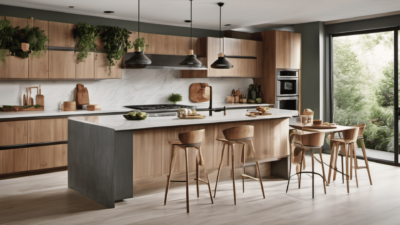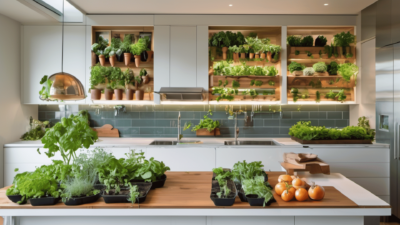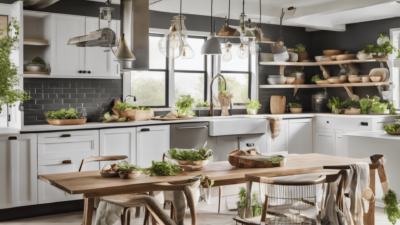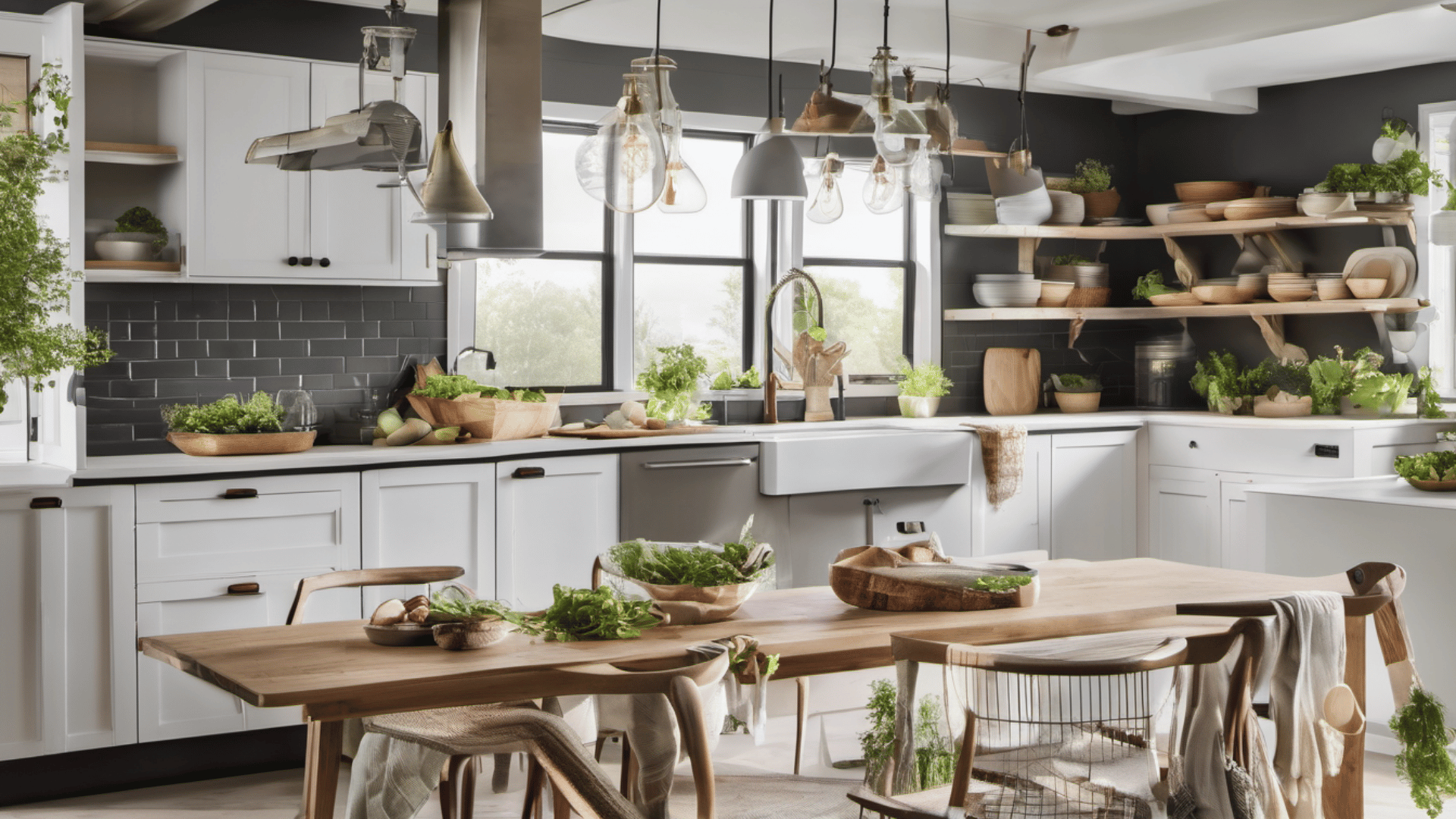Introduction
There has been an increasing tendency in recent years toward healthy living and a greater emphasis on sustainability. As a result, the modern organic kitchen has emerged, a room that combines eco-friendly methods with an emphasis on organic ingredients.
The modern organic kitchen is more than just a location to make meals; it is also a way of life that promotes general well-being. In this post, we will look at the benefits of a modern organic kitchen, how to build one, and how to keep a healthy and orderly area.
The Benefits of a Organic Modern Kitchen
A Organic Modern Kitchen has several advantages for both you and the environment. First and foremost, it encourages a better way of living. By using organic ingredients, you reduce your exposure to potentially dangerous pesticides, hormones, and antibiotics present in conventionally farmed meals. Organic produce is also higher in nutrients, resulting in more healthy and tasty meals.
A modern organic kitchen also promotes sustainable farming practices. Organic agricultural practices place a premium on soil health, water conservation, and biodiversity. By using organic foods, you are supporting farmers that labor in harmony with nature, lowering agriculture’s overall environmental effect.
How to Create a Modern Organic Kitchen
Creating a modern organic kitchen begins with reevaluating your present habits and making informed decisions. Here are some preliminary steps:
Purge Your Pantry
Take all manufactured and unhealthy foods out of your kitchen. Substitute organic alternatives such as whole grains, legumes, and natural sweeteners.
Embrace Whole Foods
Increase your intake of fresh fruits and vegetables. In your modern organic kitchen, these should form the cornerstone of every meal.
Invest in Quality Cookware
Choose eco-friendly materials such as stainless steel, cast iron, or ceramic cookware. Avoid nonstick coatings, which can leach dangerous chemicals into your meals.
Opt for Organic Cleaning Products
Traditional cleaning products frequently include harsh chemicals that can accumulate in your kitchen. Change to organic, non-toxic cleaning products that are good for you and the environment.
Essential Tools and Equipment for a Modern Organic Kitchen
In today’s fast-paced world, making conscientious choices regarding our health and the environment is becoming increasingly crucial. One place where we can have a big impact is in our own kitchens. The modern organic kitchen’s rise reflects this expanding awareness.
Having the correct tools and equipment is vital when it comes to establishing a modern organic kitchen. Organic cuisine is all about using fresh, natural ingredients and preparing them in such a way that their nutritional worth is preserved. You’ll need a few critical tools in your kitchen arsenal to accomplish this.
To begin with, a high-quality chef’s knife is a must-have in any modern organic kitchen. A sharp knife will not only make chopping and slicing easier, but it will also aid in the preservation of the ingredients you’re dealing with. For longevity and precision, choose a knife made of stainless steel or carbon steel.
A set of stainless steel pots and pans is another vital equipment for a modern organic kitchen. Stainless steel is an excellent choice because it is non-reactive, which means it will not leach dangerous chemicals into your food. Purchasing a high-quality set will ensure that your cookware will last for many years.
Finally, a blender or food processor is essential in every Organic Modern Kitchen. These multifunctional tools are ideal for making homemade sauces, dips, and smoothies from fresh, organic ingredients. To tackle a variety of activities, look for a device with numerous speed settings and a sturdy motor.
By stocking your kitchen with these basic tools and equipment, you’ll be well on your way to making tasty and nutritious meals that fit your modern organic lifestyle.
Designing a Organic Modern Kitchen

Modern organic kitchen design extends beyond tools and equipment. Health and sustainability are promoted by providing a space.
Layout is important while creating a modern organic kitchen. Better kitchens have a logical flow for simple movement and fast preparation. The “work triangle” arranges the refrigerator, stove, and sink in a triangle. This layout reduces stages and boosts efficiency.
Kitchen materials are also key design elements. Use natural, sustainable resources whenever possible. Granite, quartz, and butcher block counters are gorgeous, durable, and eco-friendly. Choose recycled or FSC-certified cabinets to reduce environmental effect.
Lighting is very important in a modern organic kitchen. Your design should include wide windows or skylights for natural light. If not, use energy-efficient LED daylight-like illumination. This will cut energy use and create a cozy atmosphere.
Finally, consider storage options. A tidy kitchen is vital for health and organization. Install many cupboards and drawers to organize your kitchen tools and materials. Display your organic cookbooks and bulk ingredient glass jars on open shelving.
Your modern organic kitchen design will be attractive, healthy, and sustainable if you pay attention to layout, materials, lighting, and storage.
Organic Gardening for the Modern Kitchen

Growing your own food in a modern organic kitchen is satisfying. You can control what goes into your fruits, vegetables, and herbs with organic gardening.
A few essentials are needed to create an organic garden. Start with nutritious organic soil. You can buy organic soil at a garden center or build compost from food leftovers and yard debris.
Choose the proper garden plants next. To grow healthy plants, consider your climate and sunlight. Modern organic kitchen gardens often incorporate tomatoes, basil, mint, leafy greens, and berries.
Organic gardening requires avoiding synthetic fertilizers and pesticides. Choose natural pest control and organic fertilizers. For pest management, utilize compost tea as a nutrient-rich fertilizer and ladybugs and lacewings.
Garden watering is also crucial. Water thoroughly and infrequently to promote deep root growth. A drip irrigation system or rain barrel can save water and reduce waste.
Organic gardening in your modern kitchen provides fresh, tasty produce and reduces your carbon footprint, promoting sustainability.
Choosing Organic Ingredients for Your Kitchen
When it comes to selecting organic goods for your modern organic kitchen, certain factors must be prioritized. While it may not be practical to buy everything organic due to financial constraints, concentrating on the following major products will have a huge influence on your health and the environment:
Produce
Start with organic fruits and vegetables that are frequently polluted with pesticides, such as apples, strawberries, spinach, and bell peppers.
Meat and Dairy
Choose organic, grass-fed meat and dairy. These are free of antibiotics and hormones, which are typical in traditional farming.
Grains and Legumes
Choose organic whole grains and legumes whenever possible. These are less likely to be genetically modified and have higher nutritional contents.
Remember that progress, not perfection, is the aim. Begin with a few organic things in your kitchen and gradually expand as your budget allows.
The Importance of Sustainable and Eco-Friendly Kitchen Products

Aside from organic ingredients, you should think about the sustainability and eco-friendliness of the products you use in your modern organic kitchen. Consider the following factors:
Energy Efficiency
Look for kitchen appliances that have good energy efficiency ratings. This not only lowers your carbon footprint but also lowers your power expenditures.
Eco-Friendly Materials
Select kitchenware made of environmentally friendly materials such as bamboo, recycled plastic, or glass. Instead of single-use plastics, choose reusable alternatives such as silicone food storage bags or stainless steel lunch containers.
Water Conservation
Install low-flow faucets and think about investing in a water filter system to save water. This saves water waste while also ensuring that your drinking water is clear of pollutants.
By emphasizing sustainable and eco-friendly kitchen products, you are helping to create a healthier planet and a more harmonious environment for preparing and eating meals.
Tips for Maintaining a Healthy and Organized Modern Organic Kitchen
It is critical to maintain your modern organic kitchen after you have designed it in order to completely reap its benefits. Here are some pointers to help you maintain your kitchen healthy and organized:
Regular Cleaning
Cleaning your kitchen on a regular basis will help to prevent the accumulation of filth, bacteria, and pests. To avoid introducing pollutants into your home, use organic cleaning products.
Proper Storage
To keep your organic ingredients fresh and prevent decomposition, store them carefully. Dry goods should be stored in airtight containers, and perishables should be refrigerated as soon as possible.
Meal Planning
Plan your meals ahead of time to reduce food wastage and ensure you have nutritious selections on hand. This also saves time and minimizes stress during the hectic weekdays.
Composting
Install a composting system in your kitchen to reduce food waste while also producing nutrient-rich soil for your garden. This completes the sustainability cycle in your modern organic kitchen.
Modern Organic Kitchen Design Ideas

Creating a room that is both useful and aesthetically beautiful is the goal of designing a modern organic kitchen. Here are some design ideas to get you started:
Natural Materials
Incorporate natural materials into your kitchen design, such as wood, stone, or cork. These materials provide warmth and a connection to the natural world.
Abundant Light
Increase natural light in your kitchen by installing large windows or skylights. Natural light not only improves the appearance of your area but also your mood and overall well-being.
Indoor Plants
Incorporate indoor plants into your kitchen decor to bring nature indoors. Plants not only filter the air, but they also bring a touch of greenery and serenity to your environment.
Incorporating Technology into your Modern Organic Kitchen
While the modern organic kitchen values natural and ecological processes, it does not preclude the use of technology. In truth, technology can improve your cooking experience and increase the efficiency of your kitchen. Here are some examples of how you can use technology into your modern organic kitchen:
Smart Appliances
Invest in smart equipment with energy-saving features and that can be operated remotely. You can monitor and alter cooking settings even when you’re not in the kitchen.
Smart Home Integration
Connecting your kitchen equipment to a smart home system allows for smooth control and automation. Voice-activated assistants, smart lighting, and temperature management are examples of this.
Modern Organic Kitchen Appliances and Gadgets
There are several tools and devices on the market that can improve your modern organic kitchen experience. Here are a couple such examples:
High-Speed Blender
A high-speed blender makes it simple to make healthful smoothies, soups, and sauces from fresh organic ingredients.
Slow Cooker
A slow cooker is a useful equipment that helps you to prepare nutritious meals with little effort. It’s ideal for people who wish to eat home-cooked meals without spending hours in the kitchen.
Navigating the Challenges of a Modern Organic Kitchen
Modern organic kitchens are healthier, but they also present obstacles. However, with some planning and preparation, you may overcome these difficulties and enjoy a sustainable and healthful kitchen.
In a modern organic kitchen, finding economical organic products is difficult. Organic and specialty foods can cost extra. Join a CSA or buy at farmer’s markets to receive fresh, organic produce at a lower price. To save money, grow herbs and vegetables in organic gardens.
Another difficulty is the short shelf life of organic compounds. Without preservatives, organic foods decay faster.
Plan meals ahead and buy only what you need to reduce waste. Store organic materials in sealed containers or beeswax wraps to keep them fresh.
Modern organic kitchens must also reduce food waste. The UN Food and Agriculture Organization estimates that one-third of global food production is wasted. Effective meal planning and imaginative use of leftovers prevent food waste. For instance, vegetable scraps can produce tasty soup, and stale bread can become croutons or breadcrumbs.
Finally, a modern organic kitchen involves ongoing learning and research. Inform yourself about organic farming, sustainable cooking, and new recipes that match your ideals. Attend workshops and seminars or join online groups to learn and meet like-minded people.
Conclusion
The modern organic kitchen represents a shift toward better living and sustainability. This trend emphasizes the use of environmentally friendly practices and organic foods to create an environment that promotes general well-being.
The advantages of a modern organic kitchen include reduced exposure to dangerous compounds present in conventionally produced meals, as well as organic produce’s increased nutritional content.
Building and maintaining a modern organic kitchen entails more than just establishing a place to make meals; it also entails adopting a healthy and environmentally conscious lifestyle.
Frequently Asked Question
What are the benefits of having a modern organic kitchen?
A modern organic kitchen promotes better living by reducing exposure to harmful chemicals in conventional foods, offers higher nutritional content in organic produce, and supports sustainable farming practices.
How can I create a modern organic kitchen?
To create a modern organic kitchen, start by purging unhealthy foods, embracing whole foods, investing in quality eco-friendly cookware, and switching to organic cleaning products. Gradually replace items with organic alternatives.
What should I prioritize when choosing organic ingredients for my modern organic kitchen?
Prioritize organic fruits and vegetables like apples, strawberries, spinach, and bell peppers, opt for organic, grass-fed meat and dairy, and choose organic whole grains and legumes for higher nutritional value and reduced exposure to chemicals.
Why is it important to consider sustainable and eco-friendly kitchen products in a modern organic kitchen?
Considering sustainable and eco-friendly kitchen products reduces carbon footprint, promotes environmental health, and creates a more harmonious environment for preparing and consuming meals.
How can I maintain a healthy and organized modern organic kitchen?
Maintain a healthy kitchen by regular cleaning using organic products, proper storage of ingredients, meal planning to minimize food waste, implementing a composting system, and integrating design elements using natural materials, abundant light, and indoor plants.


